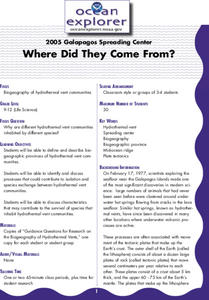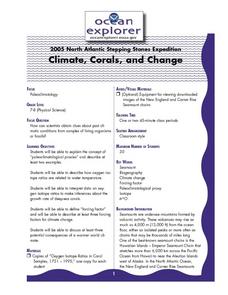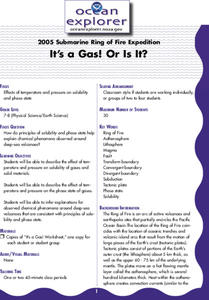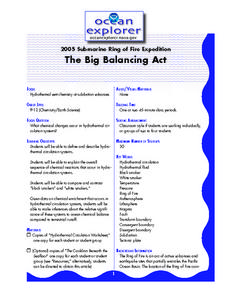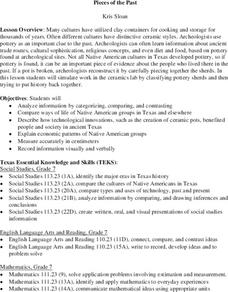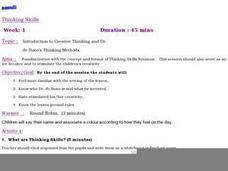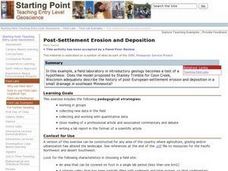Curated OER
Vegetable Lab
Third graders prepare vegetables using common methods: au gratin, minimum water method, broiled, panfry, frozen, and stuffed. They share with the rest of the class and determine which methods preserve nutrients, color, flavor and texture.
Curated OER
Life Sized Self Portrait
Students create a self-portrait that is compiled by using individual student drawings. The drawings emphasize line, shape, color and possibly texture depending upon the student's selection of materials.
Curated OER
A Worm World
Students maintain a compost bin and build a worm observatory. They design experiments relating to worms and record observations in a worm journal.
Curated OER
Realism: Landscape
Students watch videos and experiment with different mediums of art. Each day students create a project with different materials.
Curated OER
Leaving Home
Students explain the importance of larval dispersal and retention to populations. They collect data on organisms and examine it.
Curated OER
And Now for Something Completely Different...
Students identify organisms that are typical a part of a hydrothermal vent. They examine why hydrothermal vents are short-lived.
Curated OER
Where Did They Come From?
Students explain hydrothermal vents and the process in which species and the hydrothermal vents become isolated.
Curated OER
Climate, Corals, and Change
Students examine oxygen isotope ratios and how they are related to water temperature. They also identify three forcing factor changes for climate change.
Curated OER
Jelly Critters
Students compare and contrast three different organisms that are considered gelatinous zooplankton. They describe how they fit into marine food webs.
Curated OER
Just Jelly
Students identify common gelatinous zooplankton in the Canada Basin and their ecological role. They compare and contrast feeding strategies of at least three different types of gelatinous zooplankton.
Curated OER
It's a Gas! Or is it?
Learners discover the principles of solubility and phase state and their influence on chemical phenomena observed around deep-sea volcanoes. They describe the effect of temperature and pressure on solubility of gasses and solid materials.
Curated OER
It Looks Like Champagne
Students determine some practical implications of the discovery of liquid carbon dioxide in deep-ocean ecosystems. They interpret phase diagrams and explain the meaning of "critical point" and "triple point."
Curated OER
The Big Balancing Act
Students describe chemical changes occurring in hydrothermal circulation systems. They make inferences about the significance of these systems to ocean chemical balance compared to terrestrial runoff.
Curated OER
It's in the Garbage
Students analyze how studying garbage relates to methods of archaeology. They examine garbage to determine things about their culture and relate that to prehistoric peoples.
Curated OER
Try to See It My Way
Middle schoolers participate in a game to identify with other people's points of view. They complete a worksheet about minefields and locate them on a map. They work together in groups to identify why the landmines were placed where they...
Curated OER
Chicago Rhythms, Chicago Roots
High schoolers view a video about different types of music. They examine the history of jazz, big band and rock back to the city of Chicago. They discover Chicago's music scene today and compare it to the past.
Curated OER
Pieces of the Past
Seventh graders compare and contrast the way of life of Native Americans in Texas and around the country. As a class, they brainstorm about the uses of pottery today and use broken pieces of pottery to create an artifact. In groups,...
Curated OER
Chuukese Dinner (high School)
Students read journal entries about having dinner with a Chuukese family. Using this information, they identify which foods sound appealing and compare and contrast Micronesian and American foods, fruits and vegetables. In groups, they...
Curated OER
Research as a Historian, as an Artist
Students work together to research one area of history that is of an interest to them. Using primary sources, they examine photographs and disuss what they already know about the topic. They present their images and information to the...
Curated OER
Social Interactions in the Habbo Hotel
Students examine compare real life social interactions. They participate in an online website, interacting in pseudo real life activities. Students initiate conversations with others online. Students examine benefits and drawbacks to...
Curated OER
Introduction to Creative Thinking and Dr. de Bono's Thinking Methods
Students become more familiar with the setting of the lesson. They know who Dr. de Bono is and what he invented. Students know the lessons ground rules. They have sparked their creativity to be stimulated.
Curated OER
Interactive Tutorial on Inheritance Patterns Using Hypercard
Students participate in an interactive tutorial program designed to directly observe a variety of inheritance patterns. They select problems relating to genetics. They perform a calculation and receive feedback to reinforce their skills.
Curated OER
Islam in America
Learners examine the cultural and religious diversity within the United States. Using the differences, they discover they are a source of growth and change as well as conflict. They identify the changes that occur when new immigrants...
Curated OER
Post-settlement landscape evolution
Pupils use this example, a field laboratory in introductory geology becomes a test of a hypothesis: Does the model proposed by Stanley Trimble for Coon Creek, Wisconsin adequately describe the history of post-European-settlement erosion...
Other popular searches
- Learning Styles Inventory
- Identifying Learning Styles
- Learning Styles Lesson Plans
- Learning Style Inventory
- Determine Learning Styles
- Identify Learning Styles
- Learning Styles Quiz
- Learning Styles Activity
- Test for Learning Styles
- Learning Styles Children
- Learning Style Quiz
- Learning Styles Math Lessons








